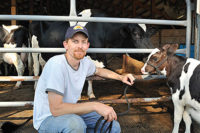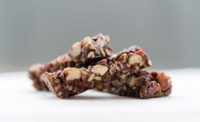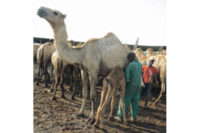Giuseppe Salzarulo, who goes by Sal, came to America in 1966 from Lioni, a small town in Italy, with no intention of making the fresh mozzarella he and his family had been producing for five generations in Italy. He joined his mother and a couple of his brothers in Brooklyn, N.Y., worked in his brother’s store, and just tried to make ends meet while selling imported pasta to small stores in New York.
He saw that these stores were also selling fresh mozzarella, but not the quality he was used to. He wasted no time telling them that “I could make it better!” He started making about 100 pounds a week of fresh mozzarella in his mother’s garage using the recipe and traditions his family had been using in Italy for years. He sold the cheese to the same local stores and they kept asking for more.
Around 1980 his nephew Salvatore Salzarulo also migrated to New York from Lioni after an earthquake destroyed the Salzarulo family’s hometown. Before long the two Sals joined together with their years of experience to form Lioni Latticini Inc., a maker of traditional fresh mozzarella products. From there the business grew mostly on word-of-mouth. They purchased a small store in Brooklyn and started selling to local restaurants and stores. At the same time they purchased their first plant in Corning, N.Y., to start producing their own curd supply for production.
Today, the family-owned business makes and distributes fresh mozzarella to over 35 states across the United States. The company has grown by approximately 8% to 10% each year.
The company still makes the majority of its own curd in the Corning plant although it also has strong curd supplier relationships. It has two main milk suppliers (sometimes three if demand calls for it) and receives about five to six trailer-loads of milk. The curd is shipped daily to its 50,000-square-foot state-of-the-art facility in Union, N.J., where all of the fresh mozzarella products are produced. Approximately 30,000 to 40,000 pounds of fresh mozzarella are produced each day to satisfy Lioni’s customer demand.
The company makes over 40 different fresh mozzarella products in various sizes, all made-to-order, including specialty mozzarella products. It does not keep an inventory of any product. It also makes fresh ricotta and its newest product Burrata Con Panna, a fresh mozzarella filled with a light and creamy authentic panna di latte and pasta filata. The company also sells Mozzarella di Bufala, an Italian specialty, imported from Italy and made from premium water buffalo milk. It’s imported within 48 hours of its production.
Today the Lioni brand is made up of about 80% retail and foodservice, and about 20% private label (retail and foodservice). The company exhibits its products each year at the Summer Fancy Food Show and also showcased its products at this year’s International Dairy-Deli-Bakery Association Show in Orlando in June.
Popular products drive growth
The success of the company is traced directly to the quality and success of its products, according to Salzarulo. Lioni’s most popular products have consistently been the 1-pound hand-wrapped fresh mozzarella, the Ciliegine in water (cherry size) and the Ovoline in water (egg size). According to Salvatore Salzarulo, vice president, the cherry and egg size products are big in restaurants and with consumers because of their versatility and portion-controlled size, from use in salad bars to appetizers at parties.
The popularity of the 1-pound hand-wrapped can be traced to its tradition, said Teresa Salzarulo Conforte, director of operations.
“Many years ago our family handmade and hand-wrapped the fresh mozzarella, but because most retail markets specifically requested an exact one pound it is now made by machine, but still hand-wrapped,” she said. “They never went to the vacuum packaging or any other packing [method]. They’ve kept the traditional packaging, which reminds them of the days of the old when mozzarella was handmade and hand-wrapped.”
Also growing in popularity is the company’s new Burrata Con Panna. Since introducing it in March last year, it’s seen huge success and demand is high. The product is handmade by Donato Amato, a master cheese-maker from Italy. They use an authentic panna similar to the one that they use in Puglia, said Andrea Salzarulo Sears, sales manager. Each piece of Burrata is individually wrapped and packaged in water to insure freshness.
“[Burrata Con Panna] is a cheese novelty right now with a lot of restaurants. It’s a new hot trend they put on their menu, especially in the tri-state area and in California,” said Conforte.
The popularity has led to recognition as well. Lioni’s Burrata Con Panna won the Gold medal at last year’s World Cheese Awards in Birmingham, England.
Tradition equals quality
The one thing Giuseppe Salzarulo constantly emphasizes is the company’s quality product.
“A strict attention to detail goes into every step of production — from the selection of the freshest whole milk, to the meticulous processing of the valuable curd, the perfect timing of the creation of the cheese, to the final inspection and in-house processing and packaging,” he said.
For Salzarulo, it’s all about consistency. “I always try to make it 99.9% the same,” he said. Over the years the company has never changed its recipe or product quality.
“Since the ‘80s, the knowledge of mozzarella products has grown immensely,” said Salzarulo. “Consumers are becoming more and more educated when it comes to fresh mozzarella products. They are seeking fresher, all-natural products and they are looking for quality. There is a great opportunity of growth for all manufacturers… but especially for Lioni, because of the quality that we produce.”
New technology
The recipe may not have changed, but the technology used by the company has seen plenty of improvements over the years, including installing customized labeling machines and a more sophisticated in-house lab for testing.
Originally the company’s retail cup line didn’t sell as well compared to the fresh one pounder, according to Conforte. The container used to be very simple, with a simple label. So the company decided it wanted to be more sophisticated and grab more attention. The new labeling now shows an image of the cheese product on the cover and describes the particular size.
“We were just trying to brand ourselves better. Each picture is different, with an explanation of the size and use of it,” she said.
“The retail cup line has increased approximately 300% since we launched the newly designed retail cups,” said Lori Church, director of sales and marketing.
The new machines have helped satisfy the growing demand for the retail product line.
The company’s overall growth led to a better in-house lab as well. For Giuseppe Salzarulo, who often tastes everything himself, making sure the product is perfect every time is important to him. The new lab helped achieve the level of perfection he was looking for.
“As we grew, we grew more sophisticated in testing, because of our quality of our customers and our market,” said Conforte. “So as we grew our lab grew along with us.”
Along with the new technology, the desire for cleaner energy and going green grew as well. Over the years Lioni has contributed by recycling various industrial materials as well as taken measures to reduce electrical consumption by installing light controlling devices. The company recognized that it could make a significant difference in the way that its manufacturing facility was utilizing its energy. The company installed a 400.4 kilowatt solar system on the roof of its manufacturing facility. This system will produce approximately 474,000 kilowatts per year. That’s enough clean energy to off-set the carbon dioxide emissions from over 1,000 barrels of oil and 50,000 gallons of gasoline, according to the company.
“Whenever we get the opportunity, we try to recycle,” said Church. When the new retail cup line was being integrated in, they refused to throw any of the old containers away; they just put the new labels on top.
As for what’s in store for the future, Salzarulo hinted that new products are on the horizon possibly for next year, but for now they’re focusing on the success of the new Burrata Con Panna.
“We intend to continue to expand through a slow and steady process while not compromising the quality,” he said.
Lioni’s product line consists of the following:
- Hand-wrapped 1-pound and half-pound fresh (regular and smoked) mozzarella
- Fresh mozzarella in water in a variety of sizes, ranging from 1-ounce pearl size to 16-ounce traditional size (this includes the 1-pound, half pound, medallions, ovoline, bocconcini, ciliegine, noccioline, perle and perline)
- Specialty mozzarella — like fresh mozzarella & prosciutto rolls and fresh mozzarella & pepperoni rolls
- Fresh mozzarella logs, loafs and braids
- Dry mozzarella (smoked and regular)
- Fresh ricotta, Burrata Con Panna and Mozzarella di Bufala
- Marinated ciliegine, marinated ciliegine with sundried tomatoes and marinated ciliegine with roasted peppers









